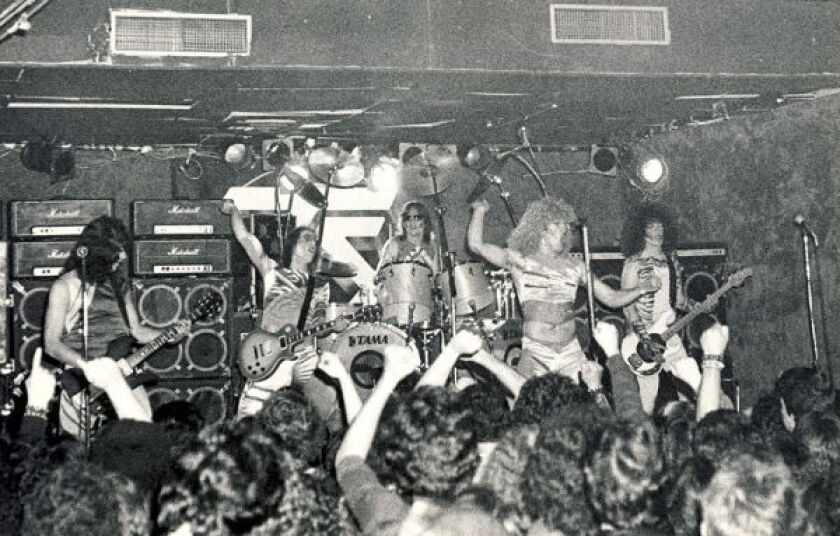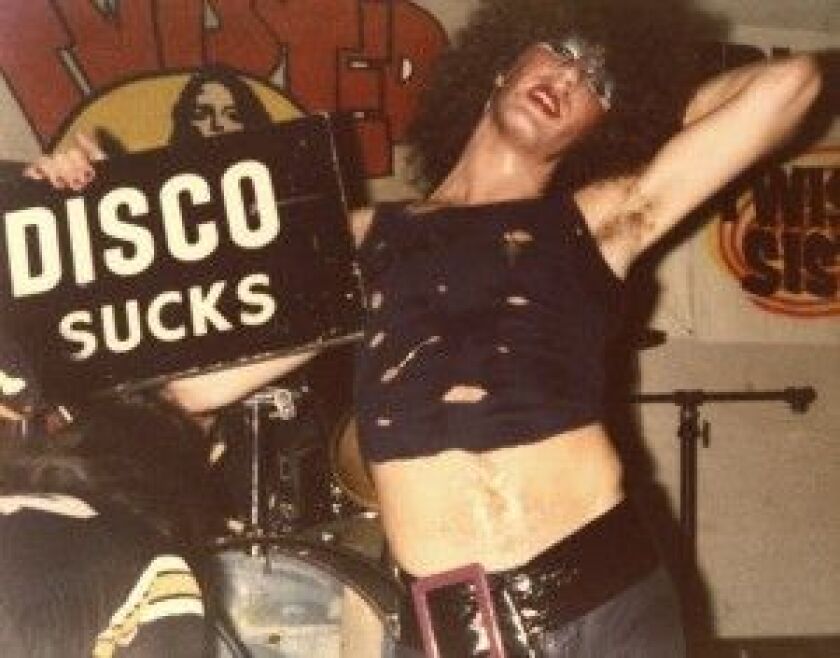“They look like women, they play like men.”
So says a clearly enthralled, on-camera television reporter at a 1982 Twisted Sister concert in England, in the opening scenes of “We are Twisted F—— Sister,” a 2014 documentary that makes its Chicago big screen premiere Feb. 22 at the Music Box Theatre.
And play like spandex-clad, big-haired, makeup-bedazzled men they did, fueled by iconic anthems such as “We’re Not Gonna Take It,” “I Wanna Rock,” and “You Can’t Stop Rock & Roll.”
The documentary homes in on the band’s rise, starting in the mid-1970s when hard-core glam rock/punk rock was all the underground rage, thanks to David Bowie, the New York Dolls, Velvet Underground and soon Twisted Sister, which quickly became the hottest bar/club band in the New York tri-state area. German filmmaker Don Horn (a self-proclaimed non-fan of the band) has assembled a documentary on the good, the bad and the very ugly of the 10 or so years leading up to Twisted Sister’s 1983 big break as “the band that killed disco.” The doc makes solid use of stock footage, a vast collection of photos (many never before seen), music videos, club and concert footage and myriad talking heads, including managers, industry insiders and the band members themselves, to tell the story of Eddie Ojeda, AJ Pero, Mark “The Animal” Mendoza, Jay Jay French and Dee Snider.
Snider recently chatted with me about the band and the documentary.
Q. The doc really leaves no stone unturned.
A. It’s all out there for the world to see. Most people have no idea what led up that moment in 1983, ’84, ’85, when they saw us for the first time. The assumption is that the path was like anybody else’s imagined path. Ours [the early incarnations, the firings/hirings, the relentless club dates, the angry exits, big-name label rejections] was quite different.
Q. What made you conclude that Twisted Sister was the band for you?
A. I had been an aspiring rock star since age of 8. It was my life’s mission. I was in a number of bands along the way. That’s part of the process. Joining Twisted Sister, I felt like, this was it. This is the band’s that’s gonna take me the distance. Which it did.
Q. The band eventually went south, in a big ugly way, as many rock bands do.
A. I would have liked the band to have a more glorious career as far as album after album. I wish we hadn’t imploded and burned out. Look, I was a megalomaniac by definition. I certainly look back on it and say what an ass—- I was. I was the lead singer, standing out there, nothing but you and this persona you create. That megalomaniac destroyed everything. But people see us now in concert, and they’re still electrified when we come together. This bunch of old men up there lighting everybody up.
Q. What do you miss most about that whole Twisted Sister “look,” and were you truly comfortable with it when it was happening?
A. I miss spandex the most. That’s what the ’80s was all about. I loved that. So many bands from that era are apologetic. They’re like, “Management made me do it.” I’m like, “I think it was cool and fun and I loved it.” We don’t do that [whole dress-up thing] anymore to the extent we did. It was hard. You dragged your ass into a 200-date tour and you’re burned out and tired and your body is beaten from the night before, and you go into the dressing room the next night and you just don’t want to do it all over again. Then you start doing your war paint. The face starts coming out. You put on your hair. And you’re transformed into that state of being and you can’t wait to start doing it again.
I can’t imagine how people today perform on stage in what amounts to their street clothes. How do you not disconnect from what you wear to go to the grocery store to being on stage? Even now on stage I have a stage outfit. And I let my hair out. I have to have some kind of transformation or I can’t do it. That’s the theatrical side of me. When I’m playing a role [the costume] helps to get into the role.
Q. You’ve maintained you never did drugs or drank, and you still don’t to this day. Did that distance you from your bandmates? Did it make fans question your rock ‘n’ roll worthiness?
A. I was an alien [to the band]. I didn’t get them and they didn’t get me. I was pretty much afraid to tell people I wasn’t high! I had to pretend I was high if people were going to accept me. At one point, I was like, “F— them!” … But I definitely experienced a form of rejection from the music community for not being a “true rocker” because of not doing drugs and not drinking.
Q. Is the documentary revisionist?
A. We didn’t set out to do a documentary. We were approached by Andrew Horn. And mind you, he’s not a fan of the band. He was interviewing me and Jay Jay for another documentary on [German New Wave singer] Klaus Nomi. In talking to us, Andrew discovered the story about the 10 years before the world discovered Twisted Sister. We endorsed the documentary. We supported it. We did shows to raise money for it and encouraged the GoFundMe sites. But we agreed we would not tell Andrew what to do. If we ever had a totally objective person for this project, he was the guy. I was like, the story he makes is story he makes. He had total autonomy. In autonomy there’s truth.
Q. David Bowie was very much an influence on the glitter-glam rock of bands such as Twisted Sister. In the documentary, Jay Jay French even says in voiceover, “There wouldn’t be a Twisted Sister if there wasn’t a David Bowie.” What are you thoughts on Bowie?
A. David was very much hard rock in the early days. It intrigues me who gets recognized [when they pass away]. In Chicago, this past month, the lead singer of American Breed [Gary Loizzo] passed away. I found out by accident because “Bend Me, Shape Me” was on the radio. He went on to become a Grammy-nominated [music] engineer. I found ONE newspaper article about his passing. That was it. I wonder when I pass away, with all I’ve said and done, what will be said about me! I never met Bowie. I don’t know what I would have said to him if I had met him.
Q. How do you want people to remember Dee Snider and Twisted Sister?
A. I want to be remembered as an entertainer. That’s what’s on my tax return. I like to think I’m a great entertainer; with Twisted Sister I was. Twisted Sister was entertaining, that’s why people loved us and why they still do.
NOTE: The documentary will be released in a collector’s edition Blu-Ray and DVD Feb. 23 by MusicBox Films.







